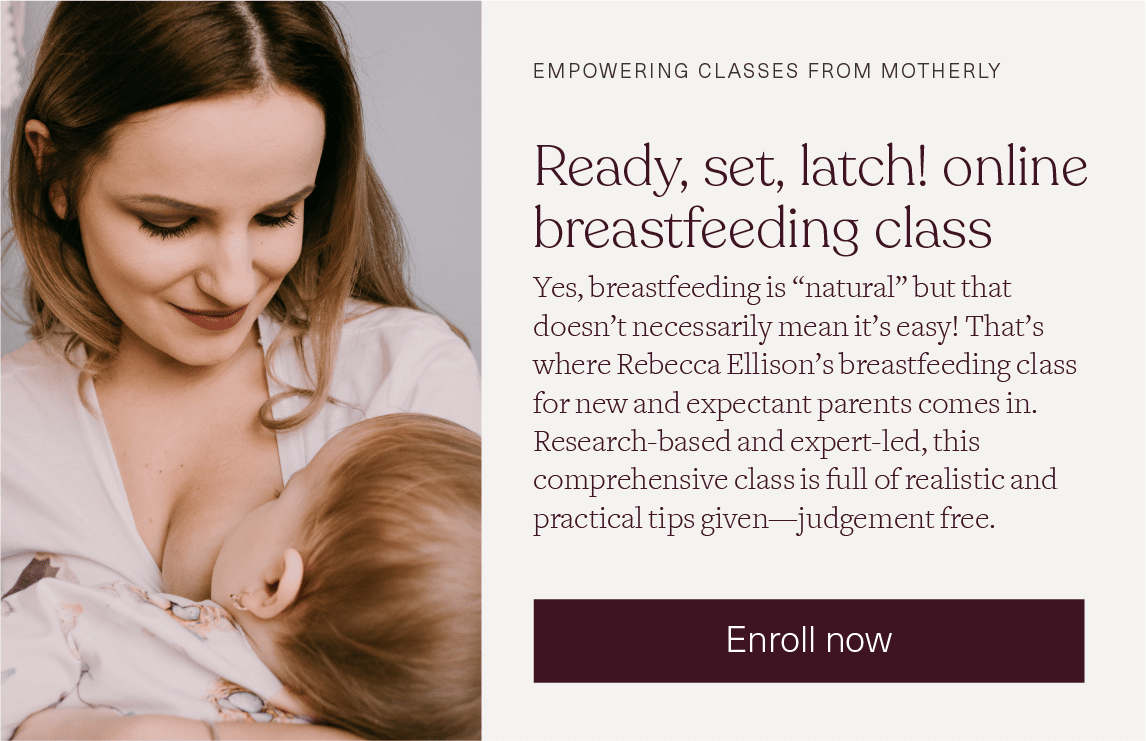7 tips to prepare you and your baby for breastfeeding success
4. Find your community

Rawpixel.com/Shutterstock

You’ve done your research and you’ve decided that you want to try to breastfeed your baby, great! Now what? The next step isn’t always clear. Are you a planner with a stack of books and a list of recommended articles? Or are you calm with the knowledge that people have been breastfeeding since the beginning of time, and feel confident breastfeeding will flow naturally? As an International Board Certified Lactation Consultant with over a decade of experience and author of two breastfeeding books, to optimize the chances of meeting your feeding goals, I generally recommend taking a little from both approaches. Whether you’re a first-time parent, or an experienced parent, set yourself up for breastfeeding success by taking the following steps before your baby arrives.

Here are 7 tips to set you and baby up for breastfeeding success:
1. Learn the basics
Sign up to take a prenatal breastfeeding class. The ideal timing is around the beginning of your third trimester. Ask your friends for class recommendations because there are many types of prenatal breastfeeding classes available. Do you want to attend a large community class in person? Or are you more interested in a virtual class you can join from your living room?
In addition to learning the basics of breastfeeding, a prenatal breastfeeding class will also teach you how to troubleshoot common issues.
If possible, bring your partner or support person to the class with you. Not only will they learn the basics of breastfeeding alongside you, but taking the class together also sets you up to be a team and to be on the same page.
Related: Top 50 breastfeeding tips, according to lactation experts
2. Talk to your partner about your breastfeeding goals
The best plans involve teamwork! After your prenatal breastfeeding class, sit down and talk about your breastfeeding goals and feeding logistics. Consider how night feedings will be managed, when to introduce a bottle, when your partner is returning to work, who will wash the bottles/pump parts, who will make meals, and how you will both find time to rest. One common challenge that many new parents share is managing sleep deprivation. They are often surprised by how much time is spent feeding the baby. Creating a plan in advance that incorporates your goals will make those early weeks much more manageable.
3. Purchase the essentials
Good news! You don’t need a lot of expensive equipment to breastfeed, but there are a few breastfeeding essentials you’ll want to have on hand before baby arrives.
First and foremost, I recommend a high-quality double electric breast pump. The ideal time to order your pump is after you’ve taken your prenatal breastfeeding class, and before the baby arrives. You want to give yourself time to sanitize the parts, assemble it and familiarize yourself with how to operate it.
Related: 13 pumping essentials every mama needs to know about
The Affordable Care Act requires that your medical insurance company provide you with a breast pump. You can order your pump by calling the customer service number on the back of your insurance card, or by going directly to a pump provider like The Lactation Network and submitting your insurance information.
You’ll also want bottles with slow-flow nipples, a breastfeeding pillow, breastmilk storage bags and hydrogel pads or nipple cream for sore nipples. Consider setting up a breastfeeding station with a large water bottle and easy-to-grab snacks.
4. Find your community
The first few weeks with a newborn can be exhausting and feel isolating. Planning ahead allows you to lean on others when you need them the most.
Look for breastfeeding support groups in your community, join new parent groups online, find the local parks where new parents hang out and research local baby classes to attend once you and your little one are ready to venture out.
Being part of these communities will help lower your anxiety, give you a place to ask for advice and support, and may lead to lifelong friendships.
5. Connect with an IBCLC
You’ve assembled your team: your OB or midwife, pediatrician, and possibly even a birth and or postpartum doula.
But did you know that studies show parents who work with IBCLCs, International Board Certified Lactation Consultants, are more than four times as likely to exclusively breastfeed their infant at one month and nearly three times more likely to do so at three months?
Connecting with a lactation consultant prenatally is an important step you can take to set yourself up for breastfeeding success. IBCLCs are highly skilled medical specialists who are trained in breastfeeding education and support. They are an essential member of your healthcare team, triaging your breastfeeding challenges and providing you with care plans to help you reach your feeding goals.
Related: Baby Feeding Tips
Before your baby arrives, schedule a prenatal consultation with a local IBCLC. (The prenatal consultation, as well as lactation consultations once the baby arrives may be covered by your insurance! Insurance coverage varies, so consider contacting your insurance company in advance to confirm coverage before your appointment.
In the prenatal breastfeeding consultation, your lactation consultant will take a medical history, discuss your breastfeeding goals, answer your breastfeeding questions, review your feeding equipment, provide local resources and create a general plan for when the baby arrives.
Once your baby is here, you’ll meet with your consultant again to assess feeding, evaluate challenges, ask questions and create a more customized plan. Your lactation consultant will become a trusted and indispensable member of your team, caring for you and your baby from first latch to weaning.
6. Collect resources and make connections
In the time remaining, consider building on your knowledge of breastfeeding by following IBCLCs on social media, watching videos on how to assemble and use the pump you chose, and browsing online breastfeeding communities.
Connect with other pregnant families in person and online. Using social media platforms like Instagram and Facebook, and apps like MeetUp and Peanut, you can meet parents who have babies around your age, live in your community, or share common interests. Interested in a park date with little ones? There are sure to be other local families who are too! Getting out of the house, making new friends, and having plans to look forward to will help manage stress and make your days more enjoyable.
Related: What pregnant moms really need to register for? Way more postpartum support
7. Enjoy this time
In the commotion of all of these exciting preparations, remember to set aside time to relax and take care of yourself before your baby is here. Consider taking a “babymoon,” a special time for you and your partner to connect. If you’re not up for taking a big trip (understandable!) book a relaxing weekend in a local hotel, or plan a day trip to a special spot. If staying home feels better, set aside time to read a good book, go to a movie, get a prenatal massage, or meet a friend for lunch.
Breastfeeding may be smooth sailing when your baby arrives, or you may face challenges, but remind yourself that you’ve taken meaningful steps to ensure that you’re well-prepared. You have a team beside you, and they are ready to support you every step of the way of your feeding journey.
This story is a part of The Motherly Collective contributor network where we showcase the stories, experiences and advice from brands, writers and experts who want to share their perspective with our community. We believe that there is no single story of motherhood, and that every mother's journey is unique. By amplifying each mother's experience and offering expert-driven content, we can support, inform and inspire each other on this incredible journey. If you're interested in contributing to The Motherly Collective please click here.